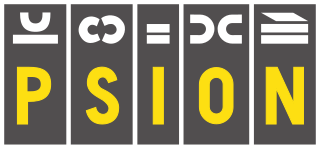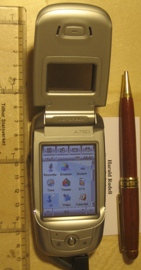Related Research Articles

Palm OS was a mobile operating system initially developed by Palm, Inc., for personal digital assistants (PDAs) in 1996. Palm OS was designed for ease of use with a touchscreen-based graphical user interface. It was provided with a suite of basic applications for personal information management. Later versions of the OS were extended to support smartphones. The software appeared on the company's line of Palm devices while several other licensees have manufactured devices powered by Palm OS.
Java Platform, Micro Edition or Java ME is a computing platform for development and deployment of portable code for embedded and mobile devices. Java ME was formerly known as Java 2 Platform, Micro Edition or J2ME.

Psion PLC was a designer and manufacturer of mobile handheld computers for commercial and industrial uses. The company was headquartered in London, England, with major operations in Mississauga, Ontario, Canada, and other company offices in Europe, the United States, Asia, Latin America, and the Middle East. It was a public company listed on the London Stock Exchange and was once a constituent of the FTSE 100 Index.

Palm is a line of personal digital assistants (PDAs) and mobile phones developed by California-based Palm, Inc., originally called Palm Computing, Inc. Palm devices are often remembered as "the first wildly popular handheld computers," responsible for ushering in the smartphone era.
Qt Extended is an application platform for embedded Linux-based mobile computing devices such as personal digital assistants, video projectors and mobile phones. It was initially developed by The Qt Company, at the time known as Qt Software and a subsidiary of Nokia. When they cancelled the project the free software portion of it was forked by the community and given the name Qt Extended Improved. The QtMoko Debian-based distribution is the natural successor to these projects as continued by the efforts of the Openmoko community.

MontaVista Software is a company that develops embedded Linux system software, development tools, and related software. Its products are made for other corporations developing embedded systems such as automotive electronics, communications equipment, mobile phones, and other electronic devices and infrastructure.
Computer operating systems based on the Linux kernel are used in embedded systems such as consumer electronics, in-vehicle infotainment (IVI), networking equipment, machine control, industrial automation, navigation equipment, spacecraft flight software, and medical instruments in general.
Windows Mobile is a discontinued mobile operating system developed by Microsoft for smartphones and personal digital assistants.

The Motorola A780 is the second cellular PDA running the Linux operating system.
A mobile operating system is an operating system used for smartphones, tablets, smartwatches, smartglasses, or other non-laptop personal mobile computing devices. While computers such as typical/mobile laptops are "mobile", the operating systems used on them are generally not considered mobile, as they were originally designed for desktop computers that historically did not have or need specific mobile features. This line distinguishing mobile and other forms has become blurred in recent years, due to the fact that newer devices have become smaller and more mobile unlike hardware of the past. Key notabilities blurring this line are the introduction of tablet computers, light laptops, and the hybridization of the two in 2-in-1 PCs.
The Motorola Razr2 (often stylized as RAZR2) is a series of clamshell/flip mobile phones from Motorola, and is one of the series in the 4LTR line. It is the successor to the popular Razr series. The Razr2 is 2 mm thinner than its predecessor but slightly wider. Some versions feature Motorola's MotoMagx operational platform, based on the MontaVista Linux OS. The Razr2 was made available on every US carrier, and EVDO, GSM and HSDPA versions of it were released by late 2007.

OpenEZX was a project active from 2004 to 2008, which gathered information about the Linux based Motorola EZX phone platform.

The Linux kernel is a free and open-source, monolithic, modular, multitasking, Unix-like operating system kernel. It was originally written in 1991 by Linus Torvalds for his i386-based PC, and it was soon adopted as the kernel for the GNU operating system, which was written to be a free (libre) replacement for Unix.
Psion Teklogix Inc. was the operational business of Psion.

ACCESS CO., LTD., founded in April 1979 and incorporated in February 1984 in Tokyo, Japan, by Arakawa Toru and Kamada Tomihisa, is a company providing a variety of software for connected and mobile devices, such as mobile phones, PDAs, video game consoles and set top boxes.

Sailfish OS is a Linux-based operating system based on free software, and open source projects such as Mer as well as including a closed source UI. The project is being developed by the Finnish company Jolla.
Besides the Linux distributions designed for general-purpose use on desktops and servers, distributions may be specialized for different purposes including computer architecture support, embedded systems, stability, security, localization to a specific region or language, targeting of specific user groups, support for real-time applications, or commitment to a given desktop environment. Furthermore, some distributions deliberately include only free software. As of 2015, over four hundred Linux distributions are actively developed, with about a dozen distributions being most popular for general-purpose use.

postmarketOS is an operating system primarily for smartphones, based on the Alpine Linux distribution.

Plasma Mobile is a Plasma variant for smartphones. It is currently available for the Pinephone, and supported devices for postmarketOS such as the OnePlus 6.
References
- ↑ Ilyas, Mohammad (2006). Smartphones. Syed Ahson. Chicago, Ill.: IEC. pp. 113–117. ISBN 978-1-931695-50-3. OCLC 65340949.
- ↑ Staff, ZDNet. "PalmSource gets cosier with Linux". ZDNet . Retrieved 2021-05-18.
- ↑ Pilato, Fabrizio. "MontaVista's Mobilinux 4.0 for mobile and wireless devices | Mobile Magazine" . Retrieved 2021-05-18.
- ↑ Gohring, Nancy (2007-09-26). "MontaVista releases new Linux-based mobile phone OS". InfoWorld. Retrieved 2021-05-18.
- ↑ "Symbian to be another open mobile platform [LWN.net]". lwn.net . Retrieved 2021-05-18.
- ↑ Webwereld, Redactie. "6 geflopte mobiele besturingssystemen". Webwereld . Retrieved 2021-05-18.
- ↑ Hochmuth, Phil (2006-11-27). "Linux on Zune soon?". Network World . Retrieved 2021-05-18.